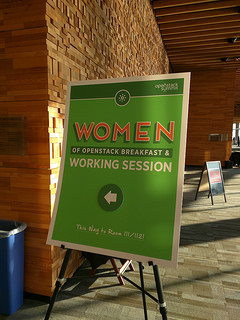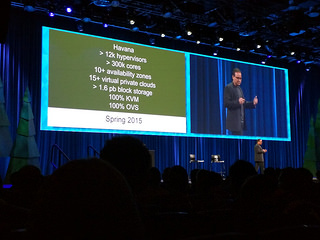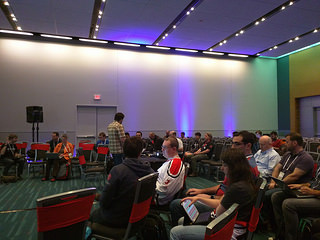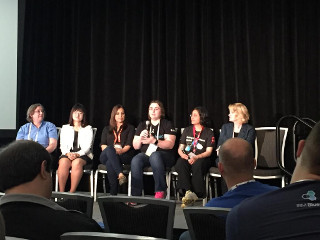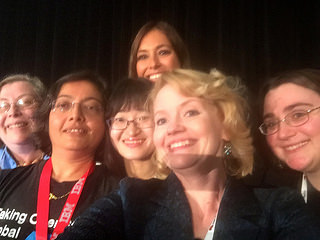My second day of the OpenStack summit came early with he Women of OpenStack working breakfast at 7AM. It kicked off with a series of lightning talks that talked about impostor syndrome, growing as a technical leader (get yourself out there, ask questions) and suggestions from a tech start-up founder about being an entrepreneur. From there we broke up into groups to discuss what we’d like to see from the Women of OpenStack group in the next year. The big take-aways were around mentoring of new women joining our community and starting to get involved with all the OpenStack tooling and more generally giving voice to the women in our community.
Keynotes kicked off at 9AM with Mark Collier announcing the next OpenStack Summit venues: Austin for the spring 2016 summit and Barcelona for the fall 2016 summit. He then went into a series of chats and demos related to using containers, which may be the Next Big Thing in cloud computing. During the session we heard from a few companies who are already using OpenStack with containers (mostly Docker and Kubernetes) in production (video). The keynotes continued with one by Intel, where the speaker took time to talk about how valuable feedback from operators has been in the past year, and appreciation for the new diversity working group (video). The keynote from EBay/Paypal showed off the really amazing progress they’ve made with deploying OpenStack, with it now running on over 300k cores and pretty much powers Paypal at this point (video). Red Hat’s keynote focused on customer engagement as OpenStack matures (video). The keynotes wrapped up with one from NASA JPL, which mostly talked about the awesome Mars projects they’re working on and the massive data requirements therein (video).
Following keynotes, Tuesday really kicked off the core OpenStack Design Summit sessions, where I focused on a series of Cross Project Workshops. First up was Moving our applications to Python 3. This session focused on the migration of Python 3 for functional and integration testing in OpenStack projects now that Oslo libraries are working in Python 3. The session mostly centered around strategy, how to incrementally move projects over and the requirements for the move (2.x dependencies, changes to Ubuntu required to effectively use Python 3.4 for gating, etc). Etherpad here: liberty-cross-project-python3. I then attended Functional Testing Show & Tell which was a great session where projects shared their stories about how they do functional (and some unit) testing in their projects. The Etherpad for this one is super valuable for seeing what everyone reports, it’s available here: liberty-functional-testing-show-tell.
My Design Summit sessions were broken up nicely with a lunch with my fellow panelists, and then the Standing Tall in the Room – Sponsored by the Women of OpenStack panel itself at 2PM (video). It was wonderful to finally meet my fellow panelists in person and the session itself was well-attended and we got a lot of positive feedback from it. I tackled a question about shyness with regard to giving presentations here at the OpenStack Summit, where I pointed at a webinar about submitting a proposal via the Women of OpenStack published in January. I also talked about difficulties related to the first time you write to the development mailing list, participate on IRC and submit code for review. I used an example of having to submit 28 patches for one of my early patches, and audience member Steve Martinelli helpfully tweeted about a 63 patch change. Diving in to all these things helps, as does supporting the ideas of and doing code review for others in your community. Of course my fellow panelists had great things to say too, watch the video!
Following the panel, it was back to the Design Summit. The In-team scaling session was an interesting one with regard to metrics. We’ve learned that regardless of project size, socially within OpenStack it seems difficult for any projects to rise above 14 core reviewers, and keep enough common culture, focus and quality. The solutions presented during the session tended to be heavy on technology (changes to ACLs, splitting up the repo to trusted sub-groups). It’ll be interesting to see how the scaling actually pans out, as there seem to be many more social and leadership solutions to the problem of patches piling up and not having enough core folks to review them. There was also some discussion about the specs process, but the problems and solutions seem to heavily vary between teams, so it seemed unlikely that a unified solution to unprocessed specs would be universal, but it does seem like the process is often valuable for certain things. Etherpad here: liberty-cross-project-in-team-scaling.
My last session of the day was OpenStack release model(s). A time-based discussion required broader participation, so much of the discussion centered around the ability for projects to independently do intermediary releases outside of the release cycle and how that could be supported, but I think the jury is still out on a solution there. There was also talk about how to generally handle release tracking, as it’s difficult to predict what will land, so much so that people have stopped relying on the predictions and that bled into a discussion about release content reporting (release changelogs). In all, an interesting session with some good ideas about how to move forward, Etherpad here: liberty-cross-project-release-models.
I spent the evening with friends and colleagues at the HP+Scality hosted party at Rocky Mountaineer Station. BBQ, food trucks and getting to see non-Americans/non-Canadians try s’mores for the first time, all kinds of fun! Fortunately I managed to make it back to my hotel at a reasonable hour.


